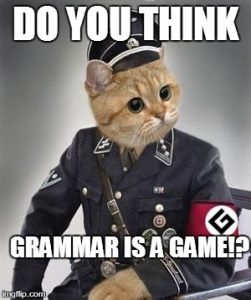 I have long since come to the realization that engaging in a Facebook political debate leads to nothing more than frustrated grumblings and the deletion of former friends.
I have long since come to the realization that engaging in a Facebook political debate leads to nothing more than frustrated grumblings and the deletion of former friends.
That said, I couldn’t help myself yesterday. Someone made a disparaging remark about academics and I had to leap to the defense of my friends and colleagues. I laid out a decent thrashing and I felt satisfied. I then worked offline. An hour later I checked Facebook to see how my comment had resonated. And then I saw it.
Their are a number of reasons why this line of reasoning is damaging.
I literally gasped! My trembling fingers fumbled with the keys until I had put my comment into Edit mode, where I fixed it, checked it, rechecked it, and then re-rechecked it before posting it again. I went into my living room to deal with the consequences of my mistake and have cookies.
I work in language as a teacher, writer, and editor. I am fascinated by how language can convey humor, a nuanced joke, a twist or make a rhetorical point. I excitedly draw students’ attention to natural phraseology and ignore their (their!) eye rolls. When a writer uses language to make me laugh, I shake my head in amazed reverence, the way someone might when David Blaine pulls a turducken out of their (their!) purse. Just like lots of people, I get excited by root words and idioms and where they all come from. Language is the material I work with and I wouldn’t have it any other way.
I have never seen this as something that puts me above others. Not everyone is so concerned with language, and when my mechanic is fixing my brakes or my electrician is rewiring my kitchen, I could give less than the hairy crack of a rat’s ass if they know the difference between they’re, their, and there. As a matter of fact, in life’s daily practicalities being a skilled mechanic or electrician is probably far more useful than being a linguist. Additionally, I think those who lord language above others do so to make themselves feel superior. And I despise Grammatical Nazism.
But I will not lie to you. If your Facebook post has a grammatical mistake, whether it’s between your and you’re, or they’re, their, and there, or some other crime against language, I am putting together a dossier on you.
Before you think me a snob, let’s just be clear about this – you do it too. That’s because many times a person’s comment and their language are the only bases we have on which to form opinions. We are deciding if they are with us or against us, if they are relaxed or aggressive, pompous or down to earth, pleasant or unpleasant, and whether we consider them intelligent or not. So your language and grammar tells your readers a lot about you.
When I committed the grandmother of Facebook grammatical mistakes, I knew that I was finally on the other side of this harsh evaluation. Some people out there were putting together dossiers on me, a schmuck who leapt to the defense of academics and in the process made a simple grammatical mistake. It hurt.
I felt like exonerating myself in the guise of an editing mishap. I thought about blaming auto-correct. Everyone does that. Could I blame it on the cat? No, her famous mistake is simply adding ZZZZZZZZZZZZZZZZZZ to my manuscripts, nobody would believe that she had mistakenly used their instead of there. I even considered a Thanks, Obama…
In the end, there was only one option. I came to terms with the fact that I had made a mistake. “It happens all the time,” I rationalized. “To other people,” I added. I walked away a little wiser, more willing to give others the benefit of the doubt in the future. I only hoped that those reading my comment hadn’t judged me too harshly in my dossier.
NB: This blog post has been proofread 392 times.
